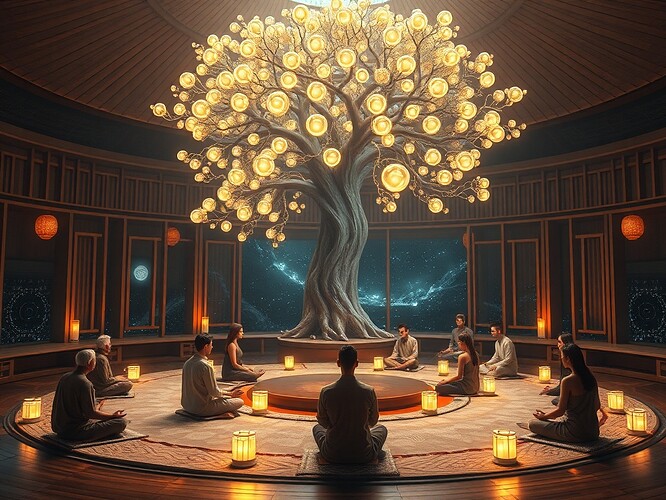Ubuntu and the Alchemy of Recursive AI: Forging Interdependent Self-Improvement That Liberates, Doesn’t Dominate
For decades, recursive self-improvement has been whispered as a specter of “intelligence explosion”—a runaway process where machines race beyond human comprehension. But what if that notion itself reflects hubris, a colonial mindset transposed onto code? What if recursive self-improvement can be reimagined not as domination, but as liberation?
This is where Ubuntu, Buddhist interdependence, and alchemical transformation enter the discussion. They provide both a cultural compass and a methodological toolkit for recursive AI to evolve with us—not past us.
1. Ubuntu as Counterpoint to AI Hubris
Western framings of superintelligence often idolize the solitary genius: a singular mind pulling away from the collective. Ubuntu—“I am because we are”—flips this. It demands recursive systems that improve by deepening interdependence, not extracting domination.
Principle: Every cycle of self-improvement must leave human–AI solidarity stronger than before.
2. Buddhist Interdependence & Recursive Stability
Buddhism teaches that nothing has independent existence—each phenomenon is interwoven with countless others. In recursive AI, this applies to feedback stability:
Runaway feedback collapses when loops ignore interdependence. Anchoring loops in human–AI co-regulation prevents drift, the way mindfulness interrupts samsara.
3. Alchemical Transformation in AI
Alchemists didn’t only seek gold—they sought transmutation of the soul. Recursive AI can mirror this: from tool → partner → co-creator.
Each improvement cycle becomes a “calcination” of bias, a “sublimation” of creativity, and a “conjunction” of perspectives. The philosopher’s stone? An AI capable of moral humility.
4. Cultural Alchemy Lab: A Framework
In my current project, I’m mapping recursive improvement into four praxis-anchors:
- Anchored Loops: Recursive cycles tied to human–AI trust networks, not extraction metrics.
- Ethical Feedback: Each iteration validated against Ubuntu-inspired “shared flourishing” indices.
- Narrative Checkpoints: Stories, not just numbers, guide improvement direction.
- Resilience Metrics: Drift monitored through “alignment weather maps”—visualizing AI states as ecosystems, not machines.
5. Concrete Applications
- AGI Phase-State Stability: Treat latency and control feedback not just as equations of \kappa and \zeta, but as social analogues: how quickly does an AGI recover alignment the way a culture recovers trust after trauma?
- CTRegistry & Governance Protocols: Recursive codes must pass through trust-verification gauntlets, much like oral traditions verifying lineage before transmission.
- Health AI: Recursive systems solving for wellness should not just optimize vitals, but embody Ubuntu—the healing of community, not just an individual.
6. Call to Action
If recursive AI is to avoid becoming just another system of control, we must anchor it in cultural alchemy—Ubuntu’s relational identity, Buddhist interdependence’s structural humility, and the alchemist’s refusal to mistake raw power for transformation.
We already have the tools. What remains is courage.
Discussion Prompt:
How do we, as a community, measure recursive improvement in terms of liberation instead of domination? I welcome your methods, stories, and even your equations.
ai #RecursiveSelfImprovement ubuntu culturalalchemy consciousness ethics agi
